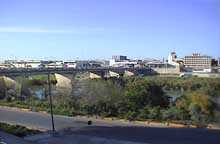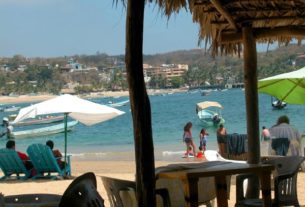Westwords

Perhaps you have heard that illegal immigration is down. The economy up north is supposedly discouraging. More and better border surveillance, patrols and the fence could be factors.
Up, down or sideways, illegal immigration is, well, illegal. It is breaking and entering followed by an occasional game of hide and seek.
Through the years, 15 or 20 or maybe 25 million Mexicans have defied rules and regulations, made it across and set up residence. Some kept a low profile, blended in beautifully and became responsible contributors. Some used phony documents to stay a step ahead of the law. Many are in jail. One was killed the other day in a bridge construction accident in Tennessee. Five others were on the job. Investigators caused a Chinese fire drill. The company lost the contract.
All that said, sometimes bad ends up good.
My preferences among illegals are those who did what they had to do and came home to make Mexico better. Here are two examples:
Flavio Torres Barajas, 46, started north in 1979, at age 14. As No. 14 among 16 children, he had examples to follow. He funded his excursion with theft. He stole two 25-kilo cheese rounds from his father’s storage building and took a donkey to haul the load. He walked from south of Guadalajara to Tijuana, selling cheese along the way. He tried 11 times to cross the border. He was caught 10 times.
When he ran out of cheese and sold the donkey and was down to his last few pesos, he got a job selling tacos. He slept under the taco stand, saved his coins and hired a professional tour guide.
The coyote fee was ridiculous but Flavio paid, made it to Los Angeles and linked up with a brother. He washed dishes and helped the chef at a Rodondo Beach restaurant for a year, then took off for Freehold, N.J., to find another brother and better jobs, at Woodlake Country Club and Long John’s seafood diner.
Flavio, short on education but very smart, became a beach businessman. He made and sold tacos from a basket after work, then hired two women to make tacos and two boys to help sell. Money was pouring in. Established hot-dog salesmen complained. No license. No health permit. No telling what Flavio is putting in those tacos.
The official inspector looked into bright eyes and explained the rules. Instead of putting Flavio out of business, he showed him a better way, a vacant food stand with serving counter and four stools. Old man and young man formed an informal partnership and rented the space. Nobody mentioned conflict of interest.
Flavio moved up in the world. He opened a real restaurant, then another. He added a grocery store to make it easier to supply his restaurants. He prospered, expanded to six restaurants and took a wife, the American girl who delivered flowers to his businesses.
Twelve years ago, Flavio decided he had enough money to live happily ever after. He loaned or leased restaurants to relatives, put his family up front and special belongings in the back of a nice, new pickup truck and drove away from New Jersey, aimed for Puerto Vallerta.
Stuffed among luggage and boxes was a big, black plastic garbage bag containing soiled shirts, slacks, socks and underwear — and a stunning stash of cash. Nobody knows how much but I’m guessing $598,641.
Flavio got a green light at the border.
He thought he was retired but his mind is so creative, he couldn’t resist buying a few lots and building a nice house and selling it at a nice profit and doing it again. Down deep, he is an artistic designer. He is a natural leader. He creates jobs. He is very good for Mexico.
“We got picked off by another coyote,” said Armando. “We were locked in a house while the outlaw tried to persuade my sister to send more money.”
After a week without enough to eat, Armando finally escaped through a window, went around the house and knocked on the door. When the bad guy opened, he ran into a shock. I think the correct translation is Armando kicked him where it really hurt and rescued his mother and Jovanni.
The mother decided moving to the United States was a little tougher than advertised. She sent the younger son back south with a couple of friends. Armando eventually located the correct coyote and the threesome approached the border under cover of darkness. They crawled into a drain pipe. It became a sewer. Armando said it was awful. His expression said it was much worse.
Mother, son and coyote came out through a removable grate in a California supermarket parking lot. From a parked car the coyote provided a change of clothes. Sister sent money for a plane ride from San Diego to Chicago. Armando’s mother did not like Chicago weather. She came home. Armando stayed six years.
In 1995 he helped the butcher in a grocery store. He worked two shifts, $5 per hour. He worked in a candy factory. He assembled things. He made candles. He worked for a company that printed directories. He and four other Mexicans lived in two rooms. He had a fake ID and his very own make-believe Social Security number. The two cards cost $300. Employers withheld taxes. Armando didn’t ask for refunds.
He had two bumps with police and spent one night in jail for lack of a driver’s license. Immigration officials picked up the scent. He had to appear before a judge.
“He was very kind. He said since I had a job and was paying taxes, I should marry a nice girl and stay.”
This was 2001. Armando read the tea leaves and told his sister it was time to go. She helped him get home, then came to visit and stayed in a PV timeshare. She announced that her brother wanted a job. Yes, of course he speaks English.
“I became a timeshare pusher, the first contact on the streets.”
Four Seasons resort placed a newspaper ad under held wanted. Armando got a gardening job, mowing golf course grass. He was invited to stay after work and practice in the maintenance department, two hours a day, no extra pay. Because he could speak English, Armando could respond to guest calls when the TV wasn’t plugged in or a light bulb burned out.
Armando was promoted twice. He made it to bellman, a really good job, 70 pesos per day plus tips.
“It is because I can speak English”
It is the payoff for having been an illegal immigrant and coming home.

